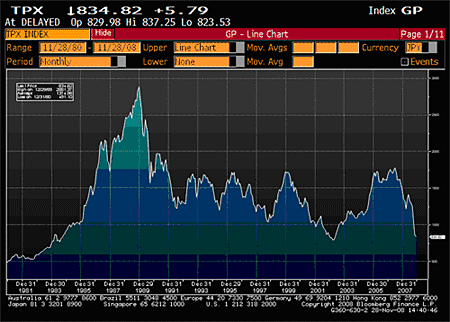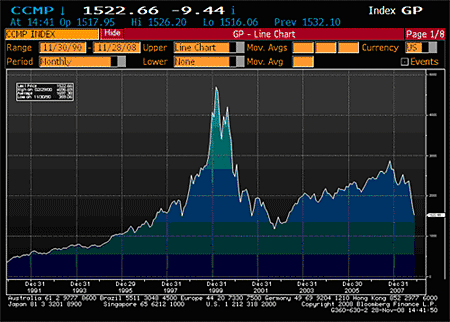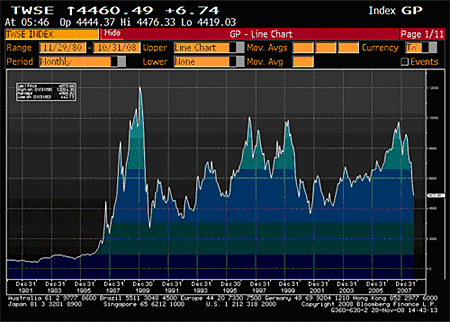What happens to markets after a bubble pops?
The recent stock market and property busts have certainly been nasty for the likes of China, Vietnam and India. And plenty of people have lost a lot of money. But, for many Asian economies, a Japan-style slump is not on the cards. Cris Sholto Heaton explains why.

Get the latest financial news, insights and expert analysis from our award-winning MoneyWeek team, to help you understand what really matters when it comes to your finances.
You are now subscribed
Your newsletter sign-up was successful
Want to add more newsletters?

Twice daily
MoneyWeek
Get the latest financial news, insights and expert analysis from our award-winning MoneyWeek team, to help you understand what really matters when it comes to your finances.

Four times a week
Look After My Bills
Sign up to our free money-saving newsletter, filled with the latest news and expert advice to help you find the best tips and deals for managing your bills. Start saving today!
This article is from MoneyWeek Asia, a FREE weekly email of investment ideas and news every Monday from MoneyWeek magazine, covering the world's fastest-developing and most exciting region. Sign up to MoneyWeek Asia here .
Bubbles are great when they're inflating. The money flows freely, everyone is getting richer by the day and work takes second place to partying. Anyone who was in Tokyo in 1989, Southeast Asia in 1996, or a tech start-up in 1999 knows the feeling well.
They also know what it's like when the merry-go-round stops. The more fun it was on the way up, the worse it feels on the way down. Payback is a bitch, as the Americans put it.
MoneyWeek
Subscribe to MoneyWeek today and get your first six magazine issues absolutely FREE

Sign up to Money Morning
Don't miss the latest investment and personal finances news, market analysis, plus money-saving tips with our free twice-daily newsletter
Don't miss the latest investment and personal finances news, market analysis, plus money-saving tips with our free twice-daily newsletter
But for investors, the aftermath can be worse than the crash. At least the crash is over fairly quickly; but the post-bubble world can doom a market to many years of poor performance. Given that a few Asian markets got pretty bubbly during the last couple of years, it's worth taking a look at how these situations usually fall out and what lessons they hold for investors
Life after a bubble
On the whole, bubbles tend to look rather similar, as you can see in three examples below. First, we have Japan's Topix benchmark in 1989

The tech-heavy Nasdaq index in 2000

And finally, one that's often forgotten: Taiwan in 1990. This is one of the most impressive stock bubbles I've ever seen up eleven-fold in less than three years.

As you'll notice, not only are these bubbles quite similar on the way up the pace accelerates and accelerates until they're rising almost vertically the aftermath is pretty consistent as well. The market tends to trade in a ranging side-to-side pattern for some years afterwards, without getting back to its bubble highs.
That's not always because the economy stagnates. Yes, Japan has been pretty sluggish since its bubble burst and that's partly because of the damage that the bust inflicted on the wider economy. However, by the end of the eighties Japan's fast-growth era was probably over in any case; it was really the phantom gains of the bubble that kept GDP growth up in the last few years before the end came.
But for an economy with higher growth potential and relatively few businesses and consumers nursing huge losses from the crash, life goes on. Taiwan grew at 6% throughout most of the nineties. Technology has been a more profitable and innovative sector since the crash, than before it.
Index investing is not always the best strategy
Despite their bubbles, emerging Asian markets such as China, India and Vietnam will fall in this second category. The stock market and property busts have certainly been nasty and plenty of people have lost a lot of money. But they don't signal a Japan-style slump for these economies.
But for investors, it may be different. Buying a simple index tracker may not be the best way to profit in a post-bubble market, no matter how well the country or sector is doing. In the example above, Taiwan has gone nowhere since 1990 (although you would have had the chance to exit with a profit in the 1997 Asia bubble, the tech bubble and last year's China bubble and to be fair Taiwan now looks pretty cheap on a long-term view).
Investors steer clear of former high-flying glamour stocks that have fallen to earth, while zombie businesses may stagger on for years, depressing the market. And ridiculous valuations like the price/earnings ratios of 100 times we saw in Japan tend to contract over a long period of time, posing another headwind for the markets, even if earnings are growing strongly.
That's not the best environment for index investing. If the market is in this kind of malaise, the only way to profit from the country's growth is to buy individual stocks: high quality companies geared to the best themes for tomorrow, which are often not the ones that powered the bubble.
Asia looks compelling value
Clearly, there are a number of Asia markets that will probably take a long time to get back to their 2007 peaks. And there are a lot of losses yet to be revealed, a lot of nasty surprises waiting on balance sheets and a lot of bankruptcies to come.
But the sheer amount of fear and forced selling in markets in the last few months means that there are also a lot of stocks trading at their most attractive valuations in many, many years. On a big picture view alone, Citigroup strategist Marcus Rosgen long one of the more bearish Asia analysts calculates that Asia ex Japan has always produced positive returns over the next one, two and three years when starting from valuations like these.
So from these levels, I expect a portfolio of good quality, good value Asian stocks to perform extremely well over the next few years, regardless of the post-bubble drag on the broader markets in several countries.
Of course, there are risks. Like most investors now, I'm expecting a pretty sharp slowdown in global growth next year. In fact, most of the forecasts I see still don't look bearish enough. For example, much of the data coming out of China suggests a pronounced slowdown there in this quarter and the first part of next year before increased government spending takes effect.
But falling inflation around the world we'll probably see a short spot of outright deflation at some point and low debt loads will mean that Asia is in the best position to rebound later next year: contrast it with the hugely-indebted US and UK economies or commodity-dependent Latin America. Yes, Asia needs to rebalance from export-centred growth to more domestic demand and that isn't going to be easy. But it will be easier than coping with a crushing consumer debt burden.
Seek out cheap insurance
Still, for all my bullishness about Asia, there's a caveat. We can look to past crashes and bygone recessions for clues but every time is different to the ones before.
So it's not impossible that we could have a more severe deflationary recession like the Great Depression, even though it seems extremely unlikely. Federal Reserve chief Ben Bernanke is already testing his theories that the depression could have been avoided with huge injections of money, while governments around the world will embark on a Keynesian spending programmes the like of which hasn't been seen for decades.
I think this will limit the short-term damage, at the cost of many governments taking on huge amounts of debt. I suspect the spending programmes will be more effective than trying to boost the money supply: at present banks are refusing to loan out the Fed's cash and it's simply piling up in their reserves. By the time they are arm-twisted into doing so, borrowers will probably be unwilling to take out fresh loans in any case. It's for this same reason that I'm not banking on runaway inflation.
But both these and other outcomes - are conceivable. And given this uncertainty, investors should not be overcommitted to one market or one idea. As Socit Gnrale's James Montier puts it in a recent note, we should accept "that we cannot and do not know everything" and "seek out cheap insurance". By insurance, he means assets with limited downside but significant upside if things don't got as we expect (as one example, he suggests that with bond markets increasingly pricing in a mildly-deflationary future, inflation-linked bonds are good insurance against the risks of an inflation spurt).
So however cheap they are, Asian stocks should not be the only thing we hold a sound portfolio is split across different assets and different regions. And dull although it is, there's nothing wrong with your portfolio including a lot of cash at times like these. I don't think it's likely that we're heading back to the Great Depression - but if we did, then cash would be king.
For more on the assets that MoneyWeek likes, the latest monthly update on our Strategic Portfolio' will be in the magazine this week. If you're not already a subscriber, you can get your first three issues free by clicking here.
Turning to the markets
| Market | Close | 5-day change |
| China (CSI 300) | 1829 | -4.7% |
| Hong Kong (Hang Seng) | 13888 | +9.7% |
| India (sensex) | 9093 | +2.0% |
| Indonesia (JCI) | 1242 | +8.3% |
| Japan (Topix) | 835 | +6.7% |
| Malaysia (KLCI) | 866 | -0.1% |
| Philippines(PSEi) | 1972 | +11.6% |
| Singapore (Straits Times) | 1733 | +4.2% |
| South Korea (KOSPI) | 1076 | +7.2% |
| Taiwan (Taiex) | 4460 | +6.9% |
| Thailand (SET) | 402 | +1.1% |
| Vietnam (VN Index) | 315 | -1.3% |
| MSCI Asia | 75 | +4.3% |
| MSCI Asia ex-Japan | 259 | +6.5% |
Asian stocks gained last week, buoyed by the rescue of Citigroup at the weekend and indications that governments around the world would spend heavily to support growth. However, other markets showed relatively little improvement. The iTraxx Asia credit default swap indices which measure the cost of insuring corporate bonds against default ticked down slightly, while most Asian currencies rose slightly against the dollar, but both credit and currency markets remain significantly weaker than just three months ago.
Shares in Gome, China's largest electronics retailer, were suspended after it replaced its chairman (and founder) who was arrested by police, reportedly on charges of manipulating shares in other companies. Gome said that the charges are not connected to its business; however investors are rattled, recalling other recent cases when the arrest of Chinese tycoons was rapidly followed by the collapse of their businesses.
In India, ratings agency Moody's downgraded Tata Motors, the country's largest commercial-vehicle maker to B1, four levels below investment grade. Moody's cited slowing demand for vehicles and pressure on profits at a time when Tata is carrying increased debt from its purchase of Jaguar and Land Rover earlier this year.
Thailand's political crisis continued to escalate. The beleagured prime minister Somchai Wongsawat declared a state of emergency after the People's Alliance for Democracy a royalist-dominated protest group who want to replace the democratically-elected government with an appointed parliament occupied Bangkok's main airport. With clashes between the PAD and government supporters growing increasingly violent, army chief Anupong Paojinda called for Somchai to call fresh elections and the PAD to abandon their protests, but denied that the army were considering a coup.
Get the latest financial news, insights and expert analysis from our award-winning MoneyWeek team, to help you understand what really matters when it comes to your finances.

Cris Sholt Heaton is the contributing editor for MoneyWeek.
He is an investment analyst and writer who has been contributing to MoneyWeek since 2006 and was managing editor of the magazine between 2016 and 2018. He is experienced in covering international investing, believing many investors still focus too much on their home markets and that it pays to take advantage of all the opportunities the world offers.
He often writes about Asian equities, international income and global asset allocation.
-
 Early signs of the AI apocalypse?
Early signs of the AI apocalypse?Uncertainty is rife as investors question what the impact of AI will be.
-
 Reach for the stars to boost Britain's space industry
Reach for the stars to boost Britain's space industryopinion We can’t afford to neglect Britain's space industry. Unfortunately, the government is taking completely the wrong approach, says Matthew Lynn